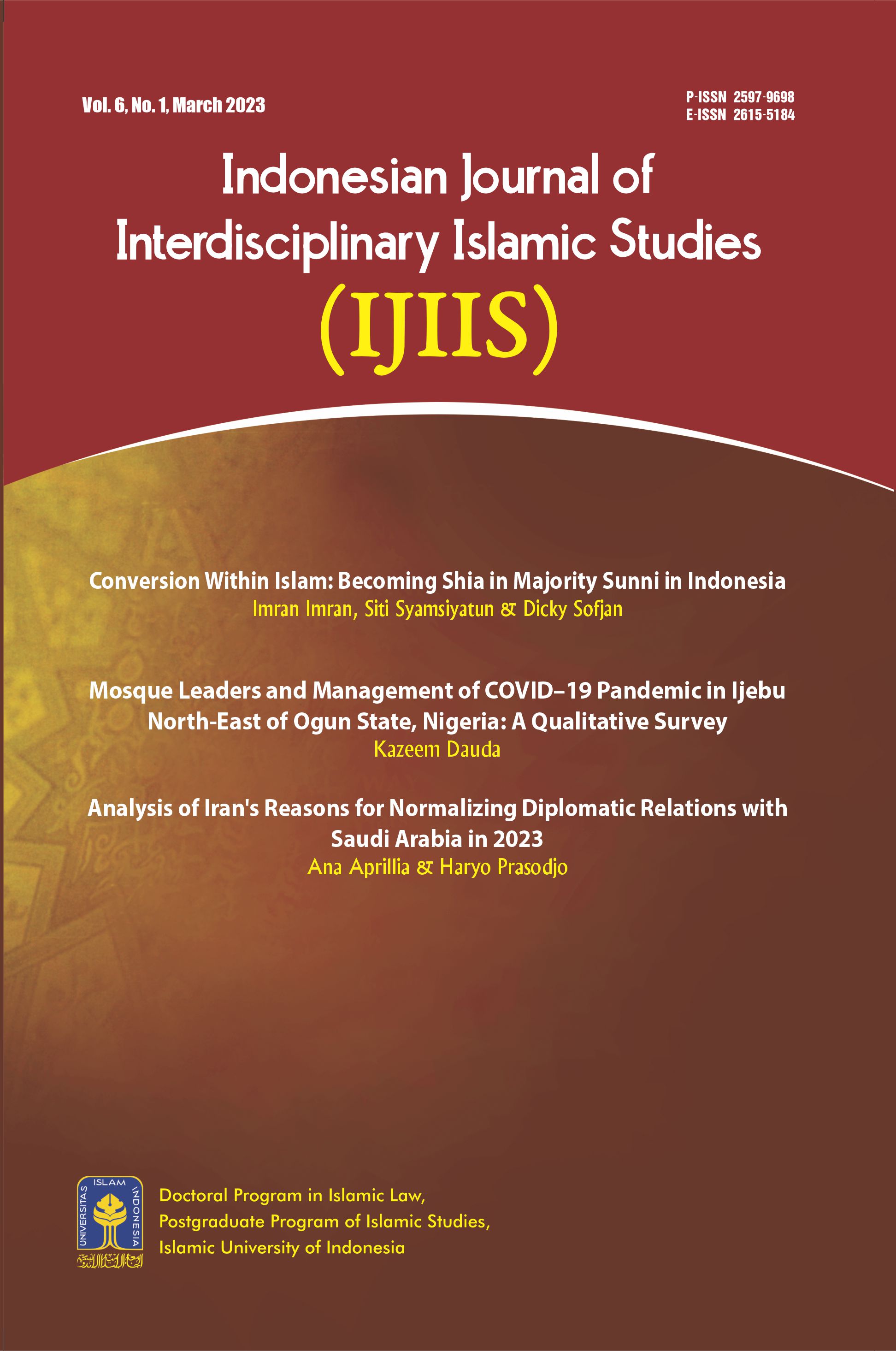Main Article Content
Abstract
This research focuses on understanding the reasons behind divorce claims made by female migrant workers at the Religious Courts of ex-Kediri Residency. These female workers have obtained permission from their husbands to seek employment abroad, and their departure is based on mutual agreement between them and their husband. However, while working overseas, these migrant workers file for divorce against their husbands, citing various reasons.This study aims to answer the question of why female migrant workers file for divorce claims at the Religious Courts of ex-Kediri Residency. The research method employed is qualitative research with a socio-legal, conceptual, and philosophical approach. The results of this study indicate six reasons for divorce claims among migrant workers at Religious Court of Kediri Residency. Firstly, economic issues play a significant role. Secondly, domestic violence within the marriage is a contributing factor. Thirdly, third-party interference from family members and friends is prevalent. Fourthly, misappropriation of funds for indulgent and lavish activities occurs. Fifthly, husbands exhibit irresponsibility or abandonment towards their wives. Lastly, some husbands display laziness and solely rely on their wives' monthly allowance. These phenomena call for efforts to restore the humanistic values of Islam, particularly regarding the provision of family livelihood from the perspective of equality and gender justice within migrant workers' families, through the implementation of mubadalah (mutual consultation).
Keywords
Article Details
Copyright (c) 2023 Khoirul Anam Anam, Amir Mu'allim, Yusdani

This work is licensed under a Creative Commons Attribution-ShareAlike 4.0 International License.
References
- Afrizal. (2014). Metode penelitian kualitatif: Sebuah upaya mendukung penggunaan penelitian kualitatif dalam berbagai disiplin ilmu (cet. 1). Rajagrafindo Persada.
- Arikunto, S. (2013). Prosedur Penelitian Suatu Pendekatan Praktik. Rineka Cipta.
- Arti kata faktor—Kamus Besar Bahasa Indonesia (KBBI) Online. (2023, February 13). https://kbbi.web.id/faktor
- Dzuhayatin, S. R., Marcoes-Natsir, L. M., & Isnanto, M. (Eds.). (2013). Menuju hukum keluarga progresif, responsif gender, dan akomodatif hak anak (Cetakan pertama). SUKA-Press.
- Kodir, F. A. (2021). Qira’ah Mubadalah. IRCiSoD.
- Marzuki, P. mahmud. (2005). Penelitian hukum. Kencana Prenada Media.
- Mosse, J. C. (2018). Gender & Pembangunan. Rifka Annisa Women’s Crisis Center dan Pustaka Pelajar.
- Pemerintah, R. (2021). Peraturan Pemerintah Republik Indonesia Nomor 59 tahun 2021 Tentang Pelaksanaan Pelindungan Pekerja Migran Indonesia.
- Satori, D., & Komariah, A. (2020). Metodologi Penelitian Kualitatif (1st ed.). Alfabeta.
- Soekanto, S. (2005). Pengantar Penelitian Hukum (Cet. 3,). UI Press.
- Subhan, Z. (2004). Kodrat perempuan, takdir atau mitos. Elkis Pelangi Aksara.
- Sugiyono. (2014). Memahami Penelitian Kualitatif. Alfabeta.
- Tanwir, T. (2017). Kajian Tentang Eksistensi Gender Dalam Perspektif Islam. Al-Maiyyah : Media Transformasi Gender Dalam Paradigma Sosial Keagamaan, 10(2), Article 2.
- Umar, N. (1999). Argumen Kesetaraan Jender: Perspektif Al-Qur’an. Paramadina.
- UU No. 23 Tahun 2004 tentang Penghapusan Kekerasan dalam Rumah Tangga [JDIH BPK RI]. (n.d.). Retrieved 14 June 2023, from https://peraturan.bpk.go.id/Home/Details/40597/uu-no-23-tahun-2004
- Wardani, A. N. (2018). Hegemoni Maskulinitas Dalam Under The Greenwood Tree Karya Thomas Hardy. 1(1).
- Wawancara dengan Narasumber di Pengadilan Agama eks Karesidenan Kediri. (2022, Mei). [Personal communication].
- Werdiningsih, W. (2020). Penerapan Konsep Mubadalah Dalam Pola Pengasuhan Anak. IJouGS: Indonesian Journal of Gender Studies, 1(1). https://doi.org/10.21154/ijougs.v1i1.2062
- Yusdani. (2009). Bersikap Adil Jender: Manifesto Keberagamaan Keluarga Jogja. Pusat Studi Islam. //perpustakaan.komnasperempuan.go.id%2Fweb%2Findex.php%3Fp%3Dshow_detail%26id%3D3568
References
Afrizal. (2014). Metode penelitian kualitatif: Sebuah upaya mendukung penggunaan penelitian kualitatif dalam berbagai disiplin ilmu (cet. 1). Rajagrafindo Persada.
Arikunto, S. (2013). Prosedur Penelitian Suatu Pendekatan Praktik. Rineka Cipta.
Arti kata faktor—Kamus Besar Bahasa Indonesia (KBBI) Online. (2023, February 13). https://kbbi.web.id/faktor
Dzuhayatin, S. R., Marcoes-Natsir, L. M., & Isnanto, M. (Eds.). (2013). Menuju hukum keluarga progresif, responsif gender, dan akomodatif hak anak (Cetakan pertama). SUKA-Press.
Kodir, F. A. (2021). Qira’ah Mubadalah. IRCiSoD.
Marzuki, P. mahmud. (2005). Penelitian hukum. Kencana Prenada Media.
Mosse, J. C. (2018). Gender & Pembangunan. Rifka Annisa Women’s Crisis Center dan Pustaka Pelajar.
Pemerintah, R. (2021). Peraturan Pemerintah Republik Indonesia Nomor 59 tahun 2021 Tentang Pelaksanaan Pelindungan Pekerja Migran Indonesia.
Satori, D., & Komariah, A. (2020). Metodologi Penelitian Kualitatif (1st ed.). Alfabeta.
Soekanto, S. (2005). Pengantar Penelitian Hukum (Cet. 3,). UI Press.
Subhan, Z. (2004). Kodrat perempuan, takdir atau mitos. Elkis Pelangi Aksara.
Sugiyono. (2014). Memahami Penelitian Kualitatif. Alfabeta.
Tanwir, T. (2017). Kajian Tentang Eksistensi Gender Dalam Perspektif Islam. Al-Maiyyah : Media Transformasi Gender Dalam Paradigma Sosial Keagamaan, 10(2), Article 2.
Umar, N. (1999). Argumen Kesetaraan Jender: Perspektif Al-Qur’an. Paramadina.
UU No. 23 Tahun 2004 tentang Penghapusan Kekerasan dalam Rumah Tangga [JDIH BPK RI]. (n.d.). Retrieved 14 June 2023, from https://peraturan.bpk.go.id/Home/Details/40597/uu-no-23-tahun-2004
Wardani, A. N. (2018). Hegemoni Maskulinitas Dalam Under The Greenwood Tree Karya Thomas Hardy. 1(1).
Wawancara dengan Narasumber di Pengadilan Agama eks Karesidenan Kediri. (2022, Mei). [Personal communication].
Werdiningsih, W. (2020). Penerapan Konsep Mubadalah Dalam Pola Pengasuhan Anak. IJouGS: Indonesian Journal of Gender Studies, 1(1). https://doi.org/10.21154/ijougs.v1i1.2062
Yusdani. (2009). Bersikap Adil Jender: Manifesto Keberagamaan Keluarga Jogja. Pusat Studi Islam. //perpustakaan.komnasperempuan.go.id%2Fweb%2Findex.php%3Fp%3Dshow_detail%26id%3D3568
